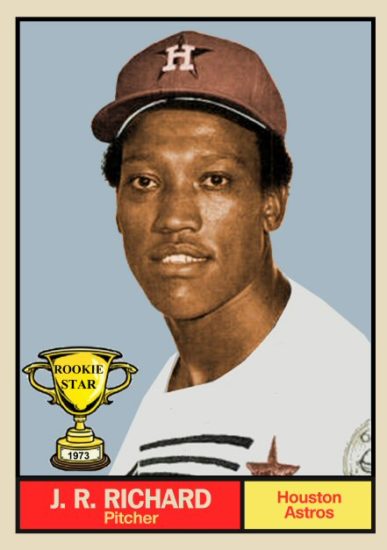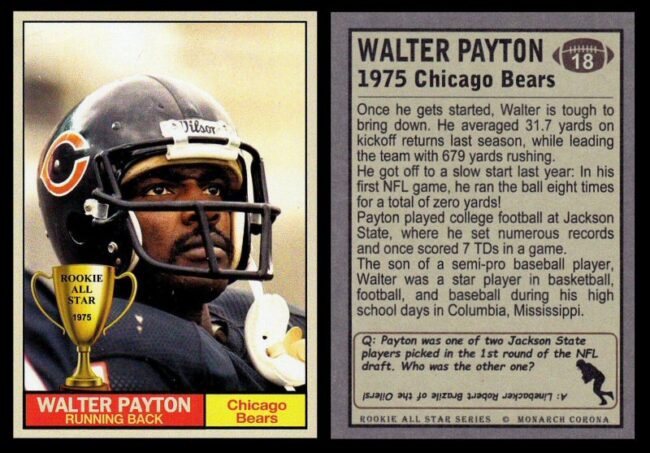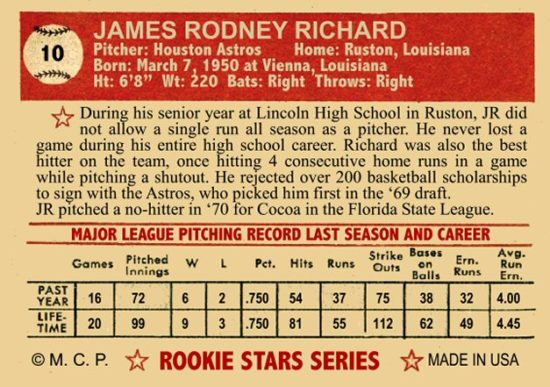
This series was printed in 2008. The idea was to showcase some of my favorite players during their rookie seasons. The baseball series ended after 22 cards, the football series went up to #20. Some of the subjects were players I had never done a card of before: Luis Tiant, Dave DeBusschere, Sam McDowell, Billy Martin, J.R. Richard, Barry Sanders, and Herschel Walker.
Rookie Stars Baseball Series:
1 Roger Maris
2 Luis Tiant
3 Johnny Bench
4 Dave DeBusschere
5 Carl Yastrzemski
6 Whitey Ford
7 Jackie Robinson
8 Willie Mays
9 Maury Wills
10 J.R. Richard
11 Thurman Munson
12 Ernie Banks
13 Billy Martin
14 Sam McDowell
15 Bob Gibson
16 Hank Aaron
17 Nolan Ryan
18 Mickey Mantle
19 Tom Seaver
20 Reggie Jackson
21 Sandy Koufax
22 Al Kaline
Rookie Stars Football Series

1 Johnny Unitas
2 Tom Landry
3 Joe Namath
4 OJ Simpson
5 Herschel Walker
6 Marcus Allen
7 Earl Campbell
8 Dan Marino
9 Tony Dorsett
10 Billy Sims
11 Warren Moon
12 Doug Flutie
13 Rocky Bleier
14 Jim Brown
15 Leroy Selmon
16 Jim Kelly
17 Bo Jackson
18 Walter Payton
19 Fran Tarkenton
20 Barry Sanders

As an Astros fan, making a card of J.R. was something I wanted to do for a long time. He was the most feared pitcher in baseball during his heyday.
There is no way to overstate how good he was as an athlete during high school. There has never been any prospect who received more basketball scholarship offers. Not Kobe Bryant, not Magic Johnson, not anyone. He pitched 3 seasons for the baseball team, and never lost a game. As a senior, he never even gave up a run! He was famous in Louisiana as a teenager.
The Astros picked him first in the 1969 draft, and he worked his way to the big leagues within two years. From 1976-79 he won 18 or more games every year, and fanned over 300 batters twice in a row. At 6 ft. 8 inches, he towered over hitters. His smoking hot fastball struck fear into opponents. He was the most intimidating pitcher in baseball.
In 1980, Richard was teamed with strikeout champion Nolan Ryan, who had joined the Astros as a free agent. During the first half of the season, Richard was virtually unhittable, starting the year with five straight wins, 48 strikeouts (including two starts with 12 and 13 strikeouts), and a sub-2.00 ERA. He was named National League Pitcher of the Month for April. At one point, Richard threw three straight complete-game shutouts, two against the Giants and one against the Cubs. On July 3, he broke Larry Dierker’s team record of 1487 career strikeouts in a 5–3 win over the Braves. It was to be Richard’s last major league victory. After finishing the first half of the season with a 10–4 record, 115 strikeouts and a 1.96 ERA, Richard was selected to be the National League’s starting pitcher in the All-Star Game on July 8, but he pitched just two innings due to various back and shoulder problems.
As the season progressed, Richard began to complain of a “dead arm”, citing discomfort in his shoulder and forearm. His concerns fell on deaf ears. Some in the media even interpreted these complaints as whining or malingering, citing Richard’s reputation for moodiness. Others hypothesized that Richard was egotistical and could not handle the pressure of pitching for the Astros, while still others suggested he was jealous of Ryan’s $4.5 million contract.
During his next start on July 14 against the Braves, Richard was pitching well and even struck out the side in the second inning, but had trouble seeing signs and had difficulty moving his arm. He left the game in the fourth inning after throwing a fastball and feeling his right arm go “dead”. He had numbness in the fingers of his right hand and could not grasp a baseball. The Astros placed Richard on the 21-day disabled list. As it turned out, it would be his final major league game.
Nine days later, he checked into a hospital in Houston for a series of physical and psychological tests to determine the cause of his mysterious arm problems. Tests revealed an obstruction in the arteries of his right arm. Richard’s blood pressure in his left arm was normal but pressure was nearly absent in his right arm due to the completely obstructed artery.
On July 30, Richard went to see a chiropractor who rotated his neck to fix the flow of blood in his upper torso region. Later that day, Richard was participating in warm-ups before the game when he suffered a major stroke and collapsed in the outfield. Before the stroke, he had a headache and a feeling of weakness through his body. Eventually, that progressed into vision problems and paralysis in the left side of his body. A massive blockage in his right carotid artery necessitated emergency surgery that evening. An examination showed that Richard was still experiencing weakness in his extremities and on the left side of his face. He also had blurred vision through his left eye. A CAT scan later showed that Richard had experienced three separate strokes from the different obstructions in his arterial system.
He spent the next three years trying to get well enough to make a comeback, but it eventually failed, and he moved back to his home state of Louisiana.
After his baseball career ended, Richard invested in some business ventures. He fell prey to an oil business scam, losing over $300,000 in the deal. A few years later, Richard paid $669,000 in a divorce settlement to ex-wife Carolyn. He married and divorced again, losing his suburban Houston home and most of his money. By the winter of 1994, Richard was homeless and destitute and living under a freeway overpass near downtown Houston.
By 1995, Richard was found to be eligible for a pension from Major League Baseball. He played in the Old Timers Day game with the Astros in the same year. In the following months, after spending many nights under the overpass, he turned to the Now Testament Church and sought help from its minister, Reverend Floyd Lewis. Richard overcame his homelessness by working with this minister, with a belief that he “always knew God was on his side”. Richard started working at an asphalt company and later returned to the church as a minister.
J. R. Richard became involved in the Houston community, working with local financial donors to help establish baseball programs for children. A small-budget 2005 movie, Resurrection: The J. R. Richard Story, depicted Richard’s baseball career as well as his life after baseball.
He is still alive and well in Houston at the time of this post.
